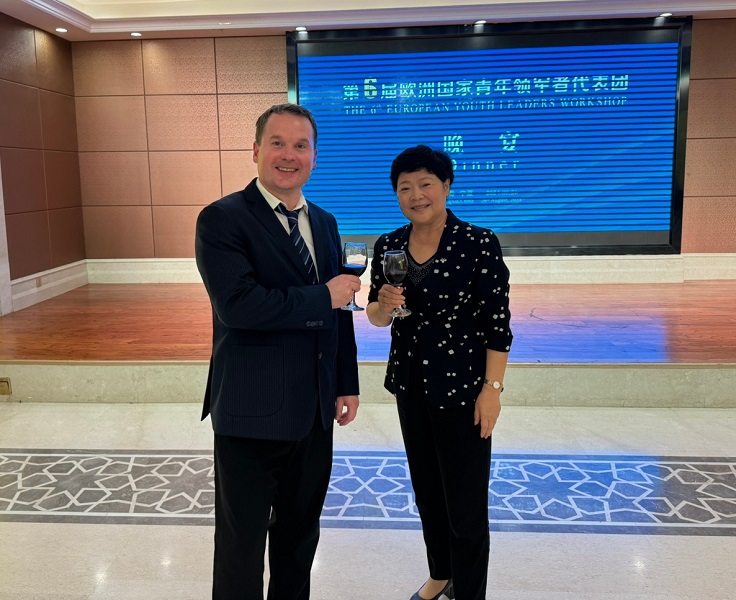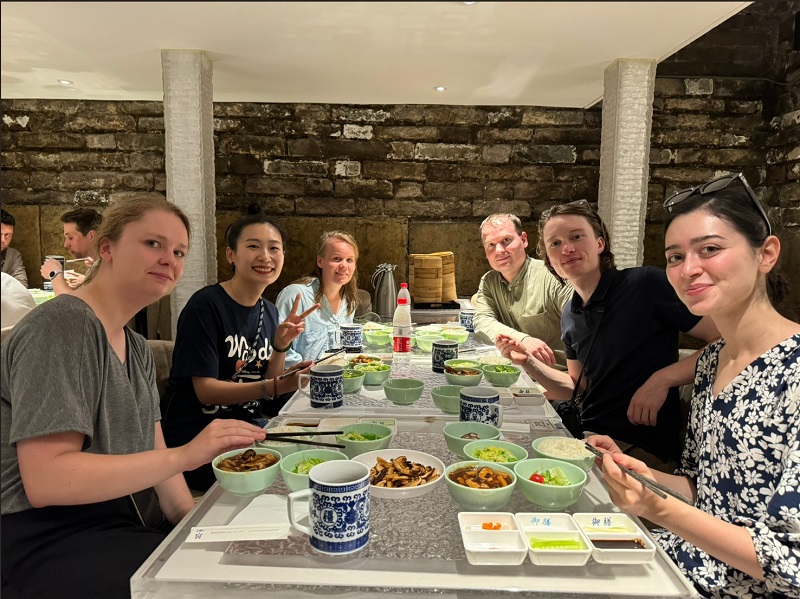China has arguably never been as prominent in the Western news media as it is now, yet still many reports on the country are written by journalists who have never set foot on its shores. This sets the scene for the risk of misunderstanding, and the result is often exaggerated and sensationalized reporting.
It was with this in mind that I expressed my interest in visiting China during one of my conversations with his Excellency He Rulong, the ambassador of China in Iceland.
A few months later the embassy invited me to join the 6th European Youth Leaders Workshop by the Ministry of Foreign Affairs of the People’s Republic of China in August 2024.

Baldur Arnarson (left) attends the 6th European Youth Leaders Workshop held by the Ministry of Foreign Affairs of the People’s Republic of China in August 2024.
Establishing Ties
It is often said about us Icelanders that we long to be lost in the crowds of the world’s great cities, while foreign visitors from these same cities long for solitude in the sparsely populated natural Icelandic scenery. Our population is so small – just about 400,000 – that we seek anonymity in the global cities. Thus, Iceland sometimes feels like a big family, and yet the country has developed a modern and outward looking society built on tourism and exports.
Some 46 years ago a Chinese delegation headed by Geng Biao, then the Vice Prime Minister of China, visited Iceland to gain insights into how so few people could sustain a modern society in a challenging environment. Among the delegates was a young man named Xi Jinping, the current President of China, who witnessed the white nights of the Icelandic summer.
Twenty years ago, Ólafur Ragnar Grímsson, then President of Iceland, headed a delegation of 220 business leaders, politicians and journalists in an official state visit to China. During the visit they were honored by the presence of Hu Jintao, then President of China, who demonstrated good will and interest in bringing the two countries closer together. The result was much to the benefit of Icelandic companies. One example is CCP Games, a software company, which registered 200,000 users during its opening day in China, with the launch of its interactive computer game EVE Online.
Three years later, in the fall of 2008, Icelanders experienced an isolation on the global stage following the collapse of the Icelandic banking system – the first of many western banking systems to face the impacts of the global financial crisis of that time.
During this dramatic period, Iceland found a strong ally in China, whose leaders offered diplomatic and material support. A milestone was reached in 2013 when the two countries signed a free trade agreement, the first between China and a European country, thus greatly contributing to the increase in bilateral trade and the exchange of goods and services. Today, the success of this agreement is evident in every sector of the Icelandic economy. Perhaps this is most evident in the automobile sector with the sales of Chinese electric vehicles in Iceland amounting to hundreds of millions of dollars since 2019.
Mutually Beneficial Cooperation
The trade between Iceland and China is in many ways a case study in how two very different economies can benefit from the liberalization of trade.
There is also a mutual benefit of comparative advantage.
Iceland has one of the most profitable seafood industries in the world and has thus been able to build highly successful industries that rely on fish products. The latest example is the proposed introduction of the products of Kerecis – a company that uses fish skin and fatty acids to treat wounds, burns and other complex conditions – into the Chinese market.
Iceland, an island divided between North American and the Eurasian tectonic plates, had to develop geothermal energy for heating in the absence of fossil fuels and woods to burn. Jiang Zemin, then President of China, was impressed by this technology when he visited Iceland in 2002 and the result was the establishment of Sinopec Green Energy. Today, millions of Chinese citizens in 85 Chinese towns and cities enjoy the benefit of this development through the utilization of geothermal energy by Sinopec Green Energy Geothermal Development, a Sino-Foreign Joint venture where Arctic Green Energy holds a 46 percent stake against Sinopec’s 54 percent. The Icelandic corporation Arctic Green Energy and its JVs form the world's largest and fastest growing geothermal heating & cooling consortium.
Iceland has, on the other hand, also greatly benefited from China’s competitive manufacturing.
After China’s accession into the WTO in 2001 – Iceland was the first among developed European countries to recognize China as a full market economy – Icelanders saw an increase in the import of Chinese products that often bore generic brand names. This provided Icelanders with more affordable goods, such as microwaves, thus increasing their purchasing power. Chinese firms have since moved up the value chain and developed their own international brands. As a result, Chinese brands such as Huawei, BYD and Lenovo have become household names in Iceland. This flow of technology from China to Iceland will continue as China develops automation and its service economy further. The planned direct flights between Iceland and China will also have a strong network effect in the business community and lead to mutual benefits.

Participants of the 6th European Youth Leaders Workshop eat dinner together.
Incredible Stay in China
During our visit to China in August last year we had the opportunity to gain insight into China’s technological development. This included a visit to Xiaomi’s highly impressive new car factory in Beijing where the SU7 electric vehicles are mass produced. We also visited Huaxi Environmental Protection Technology in Beijing to learn about the recycling of electronic waste in China, which has become a major industry. In addition, an outing to a former steel plant which has been turned into the urban Shougang Park, a site used during the 2022 Winter Olympics in Beijing, brought to light an intriguing development. The site was once one of the major pollutants sources in Beijing but has since become a public park thanks to Chinese President Xi Jinping’s efforts to clean the Beijing air. Taken together, these visits demonstrated China’s great success on the economic front, which has been underreported in Western news media.
Our group also gained insight into China’s political development. The highlight being a visit to the Museum of the Communist Party of China (CPC) in Beijing, demonstrating how the Chinese people hold their leaders in great reverence.
Another trip to Yinchuan, capital city of Ningxia Hui Autonomous Region in northwest China, enabled us to learn more about the contribution of the CPC as a ruling party in other fields of Chinese society.
Getting to see how the Party provides housing for low-income workers and how research and development is used to create new sources of income in new fields of agriculture was very enlightening.
Our visit to a reforestation site in the desert was of particular interest to me as Iceland similarly battled deforestation and land degradation in the late twentieth century.
The highlight of the nine-day visit was, however, the opportunity to meet local workers in Ningxia and to witness firsthand their disarming curiosity in guests from foreign lands.
It was with gratitude and sadness that I left China. The world cannot be fully understood without gaining some knowledge of one of the world’s truly great civilizations.
BALDUR ARNARSON is a reporter with Morgunblaðið in Iceland.